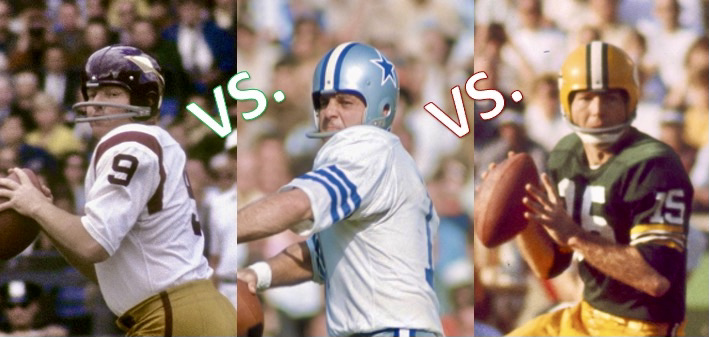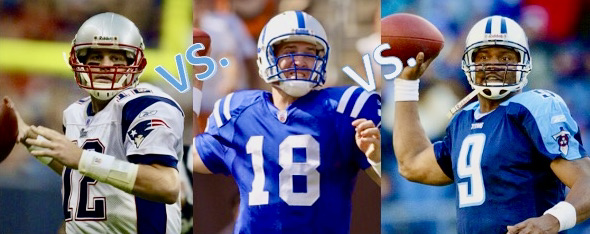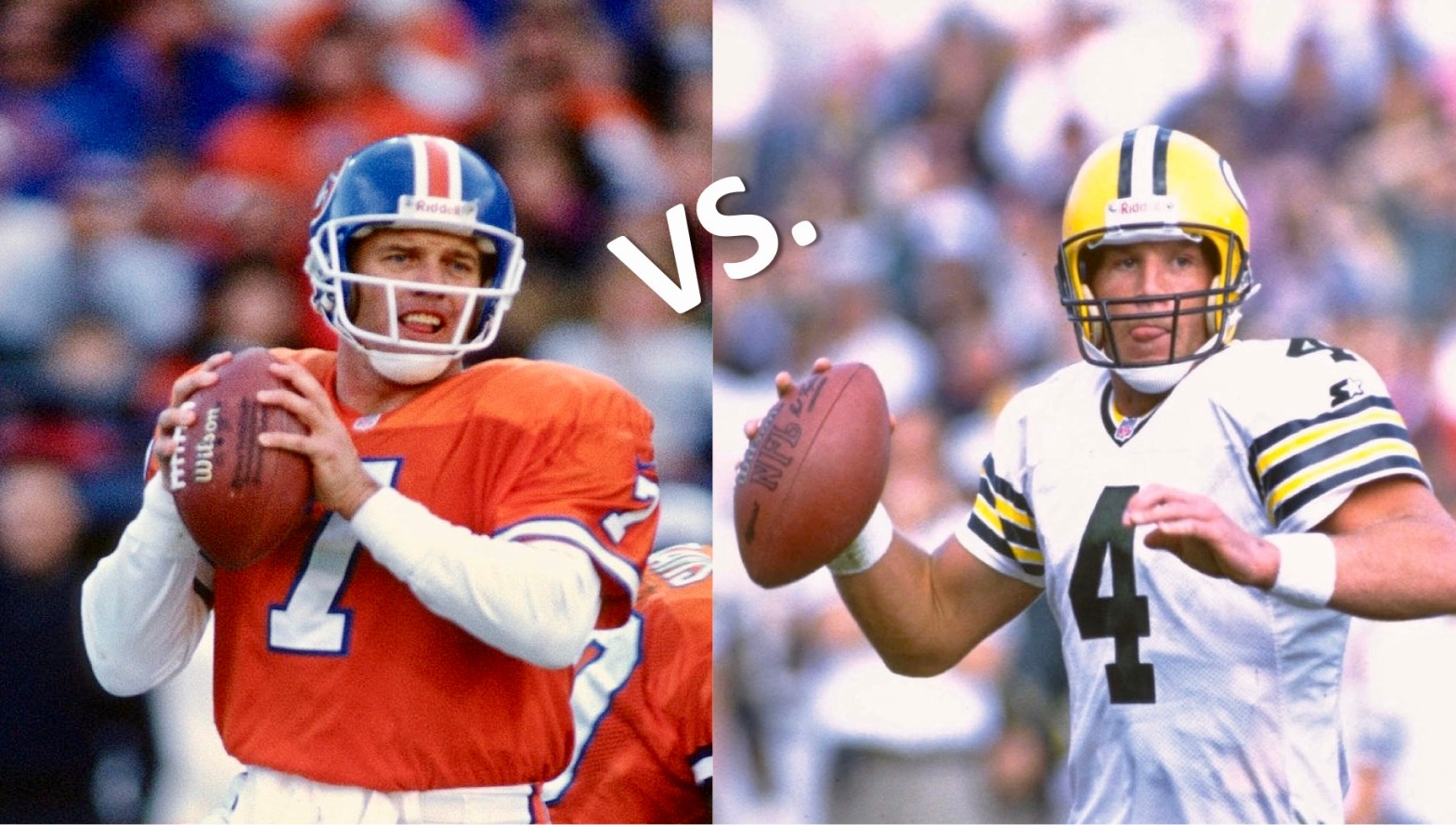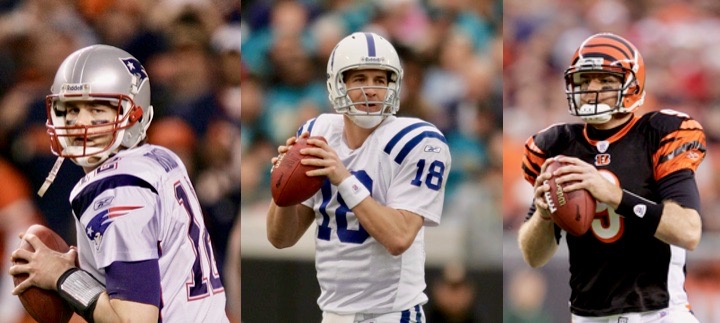Has there ever been an NFL quarterback with a more meteoric rise than Patrick Mahomes? In his first six seasons as starter, Patrick Mahomes II surpassed 5,000 yards passing twice, threw 50 touchdowns in one season, won two MVP awards, made four Super Bowls (winning two), and made six AFC Championship Games. And to think nine other teams passed on him in the 2017 NFL Draft. Oops.
Tag Archives: NFL MVP
1957 MVP Race: Tittle vs. Unitas
The All-America Football Conference (AAFC), the first major competitor to the NFL, folded in 1950 after four seasons. Before the final curtain however, there of its franchises merged with the NFL: The Baltimore Colts, the Cleveland Browns, and the San Francisco 49ers. Along with those franchises came two budding stars at the quarterback position. Cleveland’s Otto Graham would go on to win three MVPs and three championships before retiring after the 1955 season. The other star on the rise was Baltimore’s 24-year old gunslinger Y.A. Tittle. After one season, Baltimore would cease operations and their players would be entered into the 1951 National Football League Draft. At #3 overall, Tittle would find himself chosen by former AAFC rival San Francisco. There he would blossom into a quality NFL quarterback, making Pro Bowl squads in ’53 and ’54, and leading the league in TD passes in ’55.
1966 NFL MVP Race: Jurgensen vs Meredith vs Starr
Perhaps the most transformational year in pro football history, the 1966 season saw the agreed-upon merger of the National Football League (NFL) and American Football League (AFL). And although the two rival leagues were not set to play in the regular season until 1970, the 1966 season culminated in the very first AFL-NFL World Championship Game, later to be renamed Super Bowl I. Meanwhile, the Atlanta Falcons were welcomed the to NFL as the league’s 15th franchise.
2003 MVP Race: Brady vs Manning vs McNair
It’s the moment every kid dreams of: Super Bowl. Five Seconds left. Down by Seven. In the dream, the kid converts the touchdown and walks off the field in a blaze of glory. Steve McNair lived that moment… and fell one yard short. On January 30, 2000, McNair and the Tennessee Titans fell to Kurt Warner and the St. Louis Rams, 23-16. Just two weeks earlier, 1998 #1 overall draft pick Peyton Manning reached his first NFL playoff game, an eventual 19-16 loss to Steve McNair and Titans. Three months later, with the 199th pick in the 2000 NFL Draft, the New England Patriots selected quarterback Tom Brady out of Michigan.
1996 MVP Race: Elway vs. Favre
The NFL’s star of the future had officially arrived in 1995 when Brett Favre won his first Associated Press MVP award. The Green Bay gunslinger capped off the year by taking the Packers within a whiff of the Super Bowl in an NFC Championship loss to Dallas. Meanwhile, in the Mile High city, their starter of more than a decade helped lift Denver from four years of mediocrity into the AFC’s top position. And so, John Elway staked his claim as Brett Favre’s chief rival for the 1996 Most Valuable Player award.
1981 MVP Race: Anderson vs. Fouts vs. Montana vs. Morton
The 1981 NFL season was the beginning of a transitional period that culminated with an ascendancy to the quarterbacking throne. Three mainstays of the 1970s had seasons that were, if not career-bests, impressively resilient to Father Time’s pursuit and garnered them MVP votes. Meanwhile, a fourth signal caller also received votes, a 25-year old precision passer from Notre Dame beginning a decade-long run as starter for a long-suffering franchise.
1959 MVP Race: Conerly vs. Unitas
On December 28, 1958, the Baltimore Colts and the New York Giants would meet at Yankee Stadium to determine the season’s NFL champion. The result would be “The Greatest Game Ever Played”. With only two minutes to play in regulation, and down 17-14, Baltimore quarterback Johnny Unitas drove the Colts from their own 14 into Giants territory. Spontaneously inventing the two-minute drill, it would set up a Steve Myhra 20-yard field goal and send it into overtime. Minutes later, Baltimore running back Alan Ameche would pound it into the end zone for a 23-17 comeback victory.
2005 MVP Race: Brady vs. Manning vs. Palmer
Shaun Alexander was very much deserving of the 2005 Associated Press MVP award. The Seattle running back’s 1,880 rushing yards were the NFL’s best, and his 28 total touchdowns were eight more than his closest competitor, LaDainian Tomlinson. But it was another great year for quarterbacks, especially three in particular. Coming off back-to-back Super Bowl championships (and three in four years), Tom Brady would eclipse 4,000 yards passing for the first time. Peyton Manning narrowly missed out on his third straight MVP while leading the Colts to a 14-2 regular season record. And in only his second season of action, former #1 overall pick Carson Palmer would lead the league in completion percentage and touchdown passes. So while none of those three took home the hardware, which signal caller was the most deserving in 2005?
2002 MVP Race: Favre vs. Gannon vs. McNair
After toiling for over a decade serving primarily as back-up in Minnesota, Washington, and Kansas City, Rich Gannon finally got the opportunity to solidify the role of starting quarterback in 1999 with Oakland. After three really impressive years with the Raiders, Gannon would finally reach his apex, at the ripe age of 37, in 2002. He would win the Associated Press MVP award, taking 19 of 48 votes, eventually taking the 11-5 Raiders to the Super Bowl. But the award wasn’t a slam dunk. Two other quarterbacks also received double-digit votes: three-time MVP Brett Favre was close behind with 15, and future MVP Steve McNair with 11. All three signal callers had outstanding seasons, and the voting shows that Gannon’s accolade was not a given. So which QB was the real MVP in 2002?
2011 MVP Race: Brees vs. Rodgers
In 2011, two years removed from helping the New Orleans Saints win their first ever Super Bowl, Drew Brees set single-season NFL records for completion percentage (71.2%) and passing yardage (5,476). Despite those previously-unachieved accomplishments, he would garner a mere two Associated Press MVP votes. Aaron Rodgers would receive the other 48. That said, Rodgers’ first Most Valuable Player award was not at all undeserved. He would lead the Green Bay Packers to a 15-1 record, the league’s best, and his 122.5 passer rating remains an NFL record. So while Rodgers would take the prize, was he really more deserving than his counterpart in The Big Easy?









